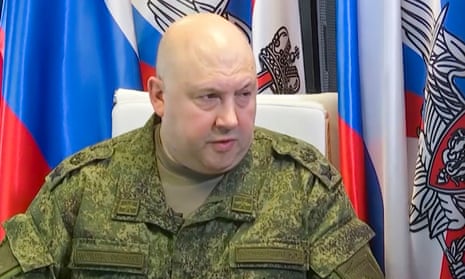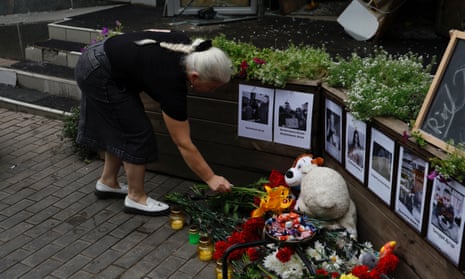Ukraine holds nuclear disaster response drills near Zaporizhzhia plant
Ukraine has conducted nuclear disaster response drills in the vicinity of the Russian-occupied Zaporizhzhia nuclear power station, regional officials say.
Yuriy Malashko, governor of the southern Ukranian region that includes the plant, said the drills in Zaporizhzhia city and the district around it were intended to coordinate the response of all services to an “emergency situation” at the plant, Reuters reports.
Ukraine accused Russia this month of planning a “terrorist” attack at the plant involving the release of radiation. Moscow denied the accusation.
Russia’s UN ambassador, Vassily Nebenzia, said on Thursday that he wrote to the UN security council and secretary general António Guterres to say:
We do not intend to blow up this NPP [nuclear power plant] we have no intention of doing so.
Reuters television footage showed rescuers in protective gear and gas masks, using dosimeters to check passenger cars and trucks for radiation levels and then cleaning wheels before vehicles underwent additional decontamination at specialised washing points.
Key events
Opening summary
Welcome back to our live coverage of Russia’s war in Ukraine. I’m Adam Fulton and here’s a snapshot of where things stand.
The United States is strongly considering sending cluster munitions to Ukraine to boost its counteroffensive against Russian forces, according to multiple news reports that cite Biden administration officials.
Cluster munitions are bombs containing smaller bomblets that scatter as they drop from the air, causing wider damage.
US officials said the decision from the White House was expected soon, CNN reported, while NBC News said it could come as early as next month.
Politico reported that late last year the Biden administration said it had “concerns” about delivering the munitions to Ukraine, mainly for humanitarian reasons and also because the US didn’t assess Ukraine as needing them at that point.
In other news:
-
Wagner mercenaries will no longer fight in Ukraine after their leader refused to sign contracts with the Kremlin. Yevgeny Prigozhin refused to sign the contracts, according to the head of the Duma defence committee, Andrei Kartapolov. He said that a few days before the attempted rebellion, Russia’s defence ministry announced that all groups performing combat missions must sign a contract with the ministry, Russian state news agency Tass reported. Prigozhin did not sign the contracts and was informed that Wagner would not take part in what the Kremlin calls the “special military operation” in Ukraine, according to Kartapolov, who added: “That is, funding, material resources will not be allocated.”
-
The Kremlin has declined to answer questions about the whereabouts of Sergei Surovikin amid unconfirmed reports that the Russian army general had been detained and was being questioned by the security services. US intelligence has claimed that Surovikin, who previously led the invasion force in Ukraine, had prior knowledge of Prigozhin’s uprising, in which Wagner mercenaries captured the city of Rostov-on-Don and moved on Moscow before striking an amnesty deal. Surovikin has not been seen in public since last Saturday.

-
Former US President Donald Trump has said now is the time for the US to try to broker a negotiated peace settlement between Russia and Ukraine and that Vladimir Putin has been “somewhat weakened” by Wagner’s aborted mutiny. “I want people to stop dying over this ridiculous war,” Trump told Reuters in an interview. Trump said everything would be “subject to negotiation” if he were president.
-
Ukrainian forces are advancing “slowly but surely” on the frontlines in the east and south-east of the country as well as around the longstanding flashpoint of Bakhmut, senior military officials have said. Ukrainian commander-in-chief Gen Valerii Zaluzhnyi told the chair of the US joint chiefs of staff, Gen Mark Milley, that his forces had “succeeded in seizing the strategic initiative”.
-
Ukraininan forces had made advances in sectors in the south designated by two occupied towns, Berdiansk and Mariupol, the Ukrainian deputy defence minister said. “Every day, there is an advance,” Hanna Maliar said on national television. “Yes, the advances are slow, but they are sure.”
-
Mike Pence met Volodymyr Zelenskiy during surprise Ukraine trip. Pence is the first Republican presidential candidate to meet the Ukrainian president during the US campaign. Pence told NBC News: “Coming here just as a private citizen … just steels my resolve to do my part, to continue to call for strong American support for our Ukrainian friends and allies.”
-
Russia has ruled out Switzerland as location for peace talks, saying it had “lost its status as a neutral state” after supporting EU sanctions. Russia’s ambassador to Switzerland said Moscow could not accept any Swiss-hosted peace summit on Ukraine after it joined EU sanctions against his country, adding that Switzerland had lost its reputation for neutrality.
-
The European Union is considering imposing a levy on interest made from frozen Russian cash that could raise about €3bn ($3.3bn, £2.6bn) a year to help Ukraine’s recovery from the war. A “windfall contribution” was to be discussed by EU leaders at a current European Council summit in an attempt to harness the value of sovereign Russian funds immobilised by sanctions.
-
The death toll in a Russian rocket attack on a pizza restaurant in the eastern Ukrainian city of Kramatorsk has risen to 12, including four children. Ukraine’s state emergency service said at least 56 people were injured, some critically, when two Iskander missiles were fired into the restaurant in the city centre on Tuesday evening. The regional governor, Pavlo Kyrylenko, said rescue attempts had ended. Russia’s defence ministry claimed it killed two Ukrainian generals and up to 50 officers in a missile strike when referring to this attack.

-
Ukraine’s SBU intelligence agency has arrested a local man it accused of helping the Russians carry out the attack on Kramatorsk. The SBU said it had arrested an employee of a gas transportation company who helped coordinate the strike and allegedly sent video footage of the cafe to the Russian military. It provided no evidence for the claims.
-
The Russian-imposed acting governor of the occupied Kherson region has denied claims that Ukrainian troops had succeeded in establishing any kind of bridgehead over the Dnipro river at the location of the Antonivskyi Bridge. Vladimir Saldo also claimed Russian forces had repelled multiple landing attempts in the area.
-
The Israeli prime minister said he had rejected calls from Washington and Kyiv to arm Ukraine due to “concerns that I don’t think any of the western allies of Ukraine have”. Benjamin Netanyahu said in an interview with the Wall Street Journal that Israel needed “freedom of action” in Syria, where Israel often bombs Iranian targets near Russian forces. He said he also had fears that Israeli weaponry could be captured in Ukraine and turned over to Iran.
-
Hungary’s vote on Sweden joining Nato has again been delayed, with the Hungarian parliament’s house committee rejecting a proposal to schedule the vote on the ratification of Sweden’s membership for next week.

